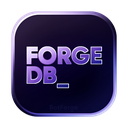An advanced DataBase extension for ForgeScript powered apps.
- Installation
- Events
- Updating
- Documentation
- Credits
- Run the following command to install the required
npm packages:
npm i @tryforge/forge.db sqlite3- Now, in your client initialization:
const { ForgeDB } = require("@tryforge/forge.db")
/* I'm assuming that the client can be an app or anything else */
const client = new ForgeClient({
...options // The options you currently have
extensions: [
new ForgeDB()
]
})Congratulations, you have successfully connected your client to a local database.
- Run the following command to install the required
npm packages
npm i @tryforge/forge.db mongodb- Now, in your client initialization:
const { ForgeDB } = require("@tryforge/forge.db")
// I'm assuming that the client, can be an app or anything else
const client = new ForgeClient({
...options // The options you currently have
extensions: [
new ForgeDB({
type: "mongodb",
url: "Your_MongoURI_URL"
})
]
})Congratulations, you have successfully connected your client to a MongoDB database
Your here because you want to try other DBs. So now just follow the steps below to set up your bot to work with other DBs:
- You have to first install ForgeDB, so you just run this command in your terminal:
npm i @tryforge/forge.db- Now that you've installed ForgeDB, you'll now have to install the DB package you want to use. Here are the ones ForgeDB currently supports:
- Better Sqlite3
npm i better-sqlite3
- MySQL
MySQL have got two versions, you can use either of them.
MySQLnpm i mysql
MySQL2npm i mysql2
- Postgres
npm i postgres
- Now that you have installed your preferred DB package, now you have to connect it with ForgeDB and ForgeScript:
const { ForgeDB } = require("@tryforge/forge.db")
// I'm assuming that the client, can be an app or anything else
const client = new ForgeClient({
...options // The options you currently have
extensions: [
new ForgeDB({
type: ""; //You've to put the DB you want to use, available: mysql, postgres, better-sqlite3, sqlite, mongodb
url?: string
host?: string
port?: number
username?: string
password?: string
})
]
})Congratulations, you have now successfully connected your DB with ForgeDB and your client is connected to it now.
- What are DB events?
DB events are the events which get triggered when certain activities happen on your DB.
- How are they helpful in developing apps powered by ForgeScript?
DB events are really helpful in developing apps owned by ForgeScript, as they help you in monitoring activity in your DB and improve your logs.
- How to use them?
Now when you finish configuring your database, you will have to head over to main file of your client and you will have to type this:
const { ForgeDB } = require("@tryforge/forge.db")
const db = new ForgeDB({
...options? //The options you have for ForgeDB if you have any
events: [] /* the events you want to use.
Available: `connect`, `variableCreate`, variableUpdate, `variableDelete` */
})
const client = new ForgeClient({
...options // The options you currently have
extensions: [ db ]
})
db.commands.add({
type: "" // Available types: connect, variableCreate, variableUpdate, variableDelete
code: `Your_Code_Goes_Here`
})Thanks for reading till the end and using ForgeDB ;)
This package was made by with love aggelos, an awesome man who develops cool ForgeScript extensions.
| Contributor | Contribution | Conatct |
|---|---|---|
| Aggelos | Main developer | Discord GitHub |
| Aditya | Descriptions for functions | Discord GitHub |
| Aurea | Made this cool readme | Discord GitHub |
| Aayush | Fixed grammatical and spelling mistakes | Discord GitHub |
| Koomball | Improved Readme file | Discord GitHub |



